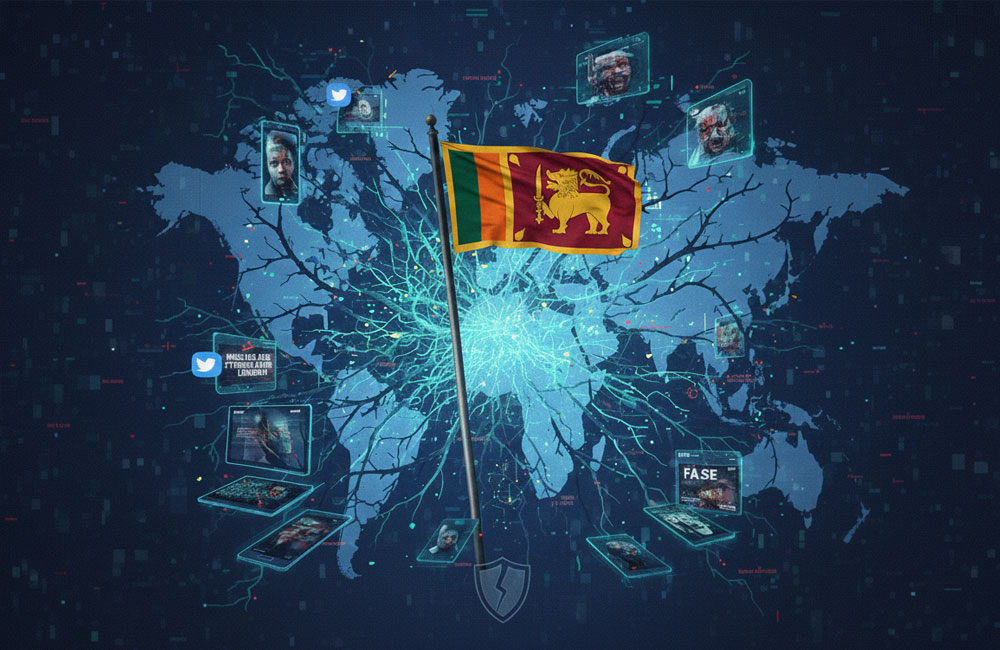A widening investigation into UK-based Sri Lankan content creator Geeth Sooriyapura has revealed an alarming cross-border network that weaponises Artificial Intelligence (AI) to manufacture hate speech, polarise communities, and exploit social media platforms for financial gain. What initially appeared to be provocative online behaviour now points to a calculated operation thriving on misinformation and algorithm-driven monetisation.
 Sri Lankan content creator Geeth Sooriyapura
Sri Lankan content creator Geeth Sooriyapura
Investigators and technology experts say the case has peeled back the layers of an emerging digital ecosystem where AI-generated videos, fabricated screenshots, and synthetic audio are deployed to push Islamophobic and anti-immigrant narratives. Media and Entertainment Lawyer Chanakya Jayadeva stressed that despite the sophistication of the tools, legal responsibility remains firmly with the human operator. “AI does not act independently. If it spreads hatred, it is because someone instructed it,” he said.
Jayadeva highlighted that Sri Lanka’s ICCPR Act provides robust provisions to prosecute individuals inciting racial or religious hostility, even when they operate from overseas. Section 3 explicitly criminalises advocating hatred that leads to discrimination or violence. Although extradition may not be possible, offenders can be charged in absentia and prosecuted if they enter Sri Lanka. Additional sections of the Act cover false statements meant to inflame religious tensions and impersonation.
The recently introduced Online Safety Act (OSA) broadens the net, penalising false statements and bot-driven communication designed to cause public disorder or hostilities between communities. Section 12 targets harmful online falsehoods, while Section 19 addresses content designed to provoke fear or public alarm. The Computer Crimes Act further strengthens enforcement in cases involving unauthorised manipulation of digital systems.
Cybersecurity expert Asela Waidyalankara said the real engine behind the operation is not politics but profit. He explained that Sooriyapura’s model taught followers how to produce sensationalist, misleading content engineered to go viral. “This is classic rage-bait. Content like ‘Muslims are taking over London’ spreads fast because it provokes anger. High engagement triggers platform algorithms, which ultimately translates into revenue,” he said.
In Sri Lanka, monetisation often works indirectly. Influencers with large followings can be paid by political groups to amplify divisive narratives, creating a grey economy of digital propaganda. According to Waidyalankara, these activities exploit platform loopholes and outpace existing detection capabilities.
Media analyst Nalaka Gunawardana warned that the dangers extend far beyond one individual. He said Sri Lankan social media is already saturated with coded hate speech that AI moderation struggles to detect in Sinhala and Tamil. Viral content often escapes automated filters, spreads widely within hours, and is only removed after user complaints—by which time damage has been done.
Sri Lanka’s cybersecurity agencies acknowledge significant constraints. SLCERT Lead Information Security Engineer Charuka Damunupola said authorities intervene only when violations are reported, adding that no system governmental or corporate can fully police online content. The sheer scale of misinformation creates inevitable blind spots.
As other nations tighten their digital safety regimes, Sri Lanka faces growing vulnerabilities. The Sooriyapura case illustrates how AI-driven misinformation networks transcend borders, targeting societies with existing ethnic and political sensitivities. Experts agree that while laws provide essential tools, long-term protection requires stronger digital literacy, ethical online behaviour, and collaboration across institutions
Leave your comments
Login to post a comment
Post comment as a guest